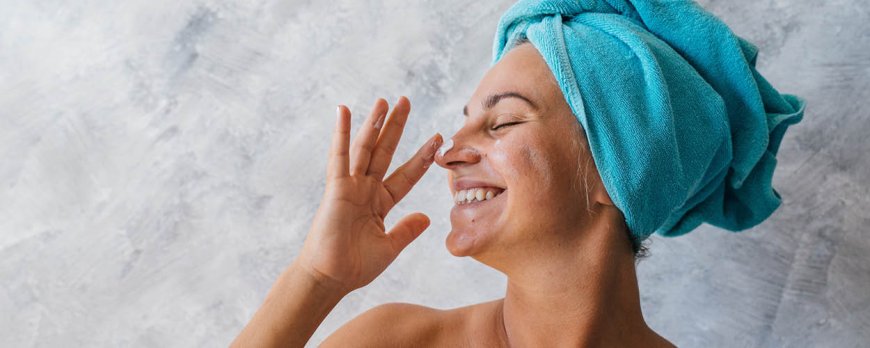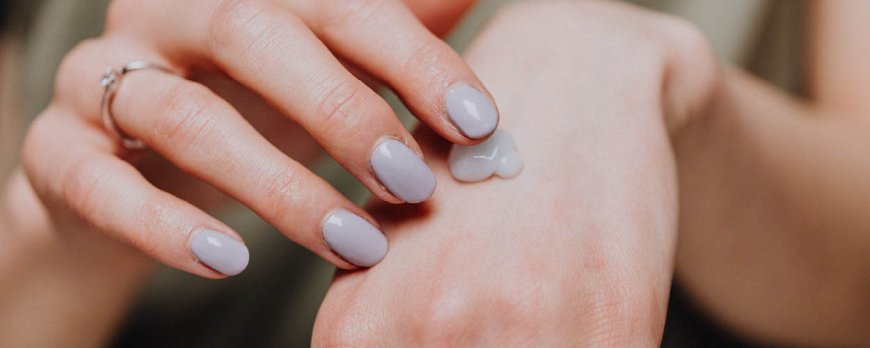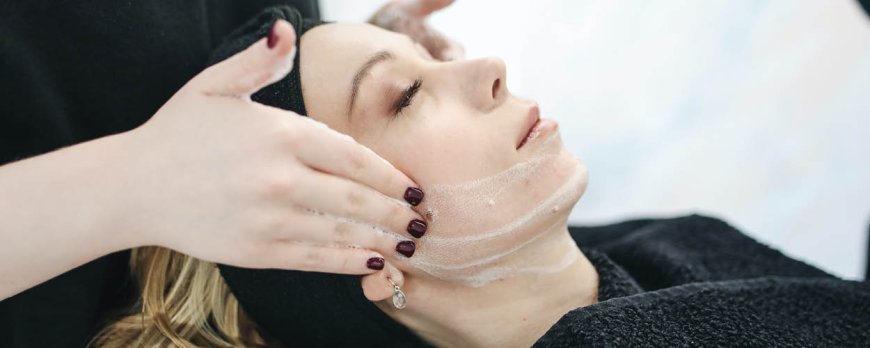Which Retinol is Best for Wrinkles?
Explore our insights on 'Which retinol is best for wrinkles?' Discover top-rated products, pro tips, and wellness methods for youthful, smooth skin.

Which Retinol is Best for Wrinkles?
When it comes to choosing the best retinol for wrinkles, it's important to understand the different types of retinoids available and their effects on aging skin. Retinol, a highly effective ingredient, is known for its ability to reduce wrinkles and improve skin texture. It works by increasing collagen production, promoting cell turnover, and reducing inflammation in the skin.
There are various types of retinoids to consider, including retinyl palmitate, retinaldehyde, retinol, tretinoin, tazarotene, and adapalene. The best retinoid for wrinkles depends on your skin type and specific needs. Retinol is a milder over-the-counter option that is suitable for most people, while prescription-strength retinoids like tretinoin and tazarotene may be recommended for those seeking stronger anti-aging support. Adapalene is an over-the-counter retinoid that is FDA-approved for acne treatment.
When incorporating retinoids into your skincare routine, it's essential to start slowly and gradually increase usage to minimize potential side effects like dryness and irritation. Additionally, wearing sunscreen during the day is crucial to protect the skin from UV damage.
There are numerous retinol products available in the market, ranging from moisturizers and serums to face oils and eye creams. Some recommended retinol products include RoC Retinol Correxion Deep Wrinkle Face Serum, Neutrogena Rapid Wrinkle Repair Regenerating Retinol Cream, Peter Thomas Roth Retinol Fusion PM Night Serum, Alastin Skincare Renewal Retinol, The Ordinary Retinol 0.5%, First Aid Beauty FAB Skin Lab Retinol Serum 0.25% Pure Concentrate, Alpha-H Vitamin A Serum with 0.5% Retinol, and Skinceuticals Retinol 0.5. For acne treatment, Differin Gel, La Roche-Posay Effaclar Adapalene Gel, and AcneFree Adapalene Gel 0.1% are recommended retinoid gels.
It's important to be aware that retinoids can cause initial purging and side effects like dryness and sunburn. Pregnant or breastfeeding individuals should avoid using retinoids altogether. To ensure you find the most suitable retinoid for your specific skincare needs, it's recommended to consult with a dermatologist who can provide personalized recommendations.
Key Takeaways:
- Retinol is a highly effective ingredient for reducing wrinkles and improving skin texture.
- There are different types of retinoids available, including retinyl palmitate, retinaldehyde, retinol, tretinoin, tazarotene, and adapalene.
- Retinol is a milder over-the-counter option suitable for most individuals, while prescription-strength retinoids offer stronger anti-aging support.
- Adapalene is an over-the-counter retinoid FDA-approved for both acne treatment and wrinkle reduction.
- When using retinoids, it's important to start slowly, gradually increase usage, and wear sunscreen during the day.
- There are many retinol products available, including moisturizers, serums, face oils, and eye creams.
- Pregnant or breastfeeding individuals should avoid using retinoids.
- Consulting with a dermatologist can help determine the most suitable retinoid for individual skincare needs.
Understanding Retinoids and Their Benefits
Retinoids, including retinol, offer numerous benefits for aging skin, such as boosting collagen production, accelerating cell turnover, and reducing inflammation, all of which contribute to smoother, more youthful-looking skin.
Collagen is a protein that provides structure to the skin, helping to keep it firm and plump. As we age, collagen production naturally decreases, leading to the formation of wrinkles and loss of elasticity. Retinol stimulates collagen synthesis, helping to restore elasticity and minimize the appearance of fine lines and wrinkles.
In addition to collagen production, retinoids also promote the turnover of skin cells. This process helps to shed dead skin cells and reveal fresh, new cells, resulting in a smoother and more even complexion. By increasing cell turnover, retinoids can also fade age spots and improve the overall texture of the skin.
Furthermore, retinol has anti-inflammatory properties that can reduce redness and irritation in the skin. This makes it particularly beneficial for individuals with sensitive or acne-prone skin, as it can help calm inflammation and breakouts.
Choosing the Right Retinoid for Your Skin
- Retinol is a milder over-the-counter option that is suitable for most people.
- Prescription-strength retinoids like tretinoin and tazarotene are more potent and may be recommended for those seeking stronger anti-aging support.
- Adapalene is an over-the-counter retinoid that is FDA-approved for acne treatment.
When incorporating retinoids into your skincare routine, it's important to start slowly and gradually increase usage to minimize potential side effects like dryness and irritation. It's also essential to wear sunscreen during the day to protect the skin from UV damage. Consulting with a dermatologist can help determine the most suitable retinoid for your specific skincare needs.

Choosing the Right Retinoid for Your Skin
Finding the right retinoid for your skin requires considering factors such as your skin type, specific concerns, and desired results. With the variety of retinoids available, it's essential to choose one that suits your individual needs.
Here are some key considerations to keep in mind:
- Skin Type: Different retinoids may work better for certain skin types. For sensitive skin, milder options like retinyl palmitate or retinaldehyde may be more suitable, while normal or resilient skin can tolerate stronger retinoids like retinol or tretinoin.
- Concerns: Identify your specific skincare concerns, whether it's reducing fine lines and wrinkles, improving skin texture, or treating acne. Different retinoids have varying strengths and targeted benefits, so select one that addresses your primary concern.
- Desired Results: Consider your desired outcome and timeframe. Some retinoids may provide noticeable results more quickly, while others may require longer-term use for visible improvements.
Retinoid Options
Now that you have a better understanding of your skin type, concerns, and desired results, let's explore the different retinoid options:
- Retinol: This milder over-the-counter retinoid is suitable for most individuals and offers effective wrinkle reduction and skin texture improvement. It is available in various formulations such as moisturizers, serums, oils, and eye creams.
- Prescription-Strength Retinoids: Tretinoin and tazarotene are prescription-strength retinoids that provide stronger anti-aging support. They are recommended for individuals seeking more potent results and have advanced signs of aging.
- Adapalene: FDA-approved for acne treatment, adapalene is an over-the-counter retinoid that also helps reduce wrinkles. It is available in gel form and can be beneficial for those dealing with both acne and signs of aging.
Remember, when incorporating retinoids into your skincare routine, it's important to start slowly and gradually increase usage to minimize potential side effects like dryness and irritation. Additionally, always wear sunscreen during the day to protect your skin from harmful UV damage.
Consulting with a dermatologist is crucial for personalized recommendations. They can assess your skin, address any concerns, and recommend the most suitable retinoid based on your unique needs, ensuring you achieve the best possible results.

Incorporating Retinoids into Your Skincare Routine
Incorporating retinoids into your skincare routine can effectively target fine lines and reduce wrinkles, but it's crucial to introduce them gradually and take necessary precautions. Retinoids, such as retinol, work by increasing collagen production, promoting cell turnover, and reducing inflammation in the skin, resulting in improved texture and diminished signs of aging.
When starting with retinoids, it's important to begin with a low concentration and gradually increase usage over time. This helps minimize potential side effects such as dryness, redness, and irritation. Start by using retinoids every other night, and then gradually increase to nightly application. It's also essential to wear sunscreen during the day to protect your skin from the sun's harmful UV rays.
Tips for Incorporating Retinoids:
- Start with a low concentration of retinol and gradually increase usage
- Apply retinoids every other night, and then progress to nightly application
- Always wear sunscreen during the day to protect your skin
- Use retinoids as part of your nighttime skincare routine, following cleansing and toning
- Apply a moisturizer after using retinoids to help combat any dryness or sensitivity
In addition to retinol creams and serums, there are various retinol-infused skincare products available, including moisturizers, face oils, and eye creams. It's important to choose products that suit your specific needs and skin type. Some popular retinol products known for their effectiveness in reducing wrinkles include RoC Retinol Correxion Deep Wrinkle Face Serum, Neutrogena Rapid Wrinkle Repair Regenerating Retinol Cream, Peter Thomas Roth Retinol Fusion PM Night Serum, and Alastin Skincare Renewal Retinol.
Remember, everyone's skin is different, so it's always best to consult with a dermatologist who can assess your skincare needs and recommend the most suitable retinoid products for your individual situation. They can also provide guidance on how to incorporate retinoids into your skincare routine effectively.
Recommended Retinol Products for Wrinkles
When it comes to choosing a retinol product for reducing wrinkles, there are several top-rated options renowned for their effectiveness. Retinol, a form of vitamin A, has been proven to stimulate collagen production, increase cell turnover, and improve skin texture. Here are some highly recommended retinol products that have received rave reviews for their anti-aging properties:
- RoC Retinol Correxion Deep Wrinkle Face Serum: This serum is specifically formulated to reduce the appearance of deep wrinkles and fine lines. It contains a combination of retinol and hyaluronic acid, which helps to hydrate and plump the skin, resulting in a smoother complexion.
- Neutrogena Rapid Wrinkle Repair Regenerating Retinol Cream: This retinol cream is designed to visibly reduce the signs of aging, including wrinkles, fine lines, and uneven skin tone. It is formulated with accelerated retinol SA and hyaluronic acid to deliver fast results.
- Peter Thomas Roth Retinol Fusion PM Night Serum: This powerful serum contains a time-released microencapsulated retinol that gradually delivers the retinol to the skin, minimizing potential irritation. It helps to improve the appearance of fine lines, wrinkles, and uneven skin tone.
- Alastin Skincare Renewal Retinol: This retinol product is enriched with a unique blend of retinol, antioxidants, and peptides to improve the skin's texture and reduce the appearance of fine lines and wrinkles. It also helps to enhance skin elasticity and firmness.
These are just a few examples of the many retinol products available on the market. Each product offers its own unique formulation and benefits, so it's important to choose one that aligns with your specific skincare needs and preferences. Remember to start with a lower concentration of retinol and gradually increase usage to minimize potential side effects. Additionally, always wear sunscreen during the day to protect your skin from UV damage.
It's worth noting that retinol products may not be suitable for everyone, especially pregnant or breastfeeding individuals. If you have any concerns or specific skincare needs, it's best to consult with a dermatologist who can provide personalized recommendations and guidance on the most suitable retinol product for your skin.

Over-the-Counter Retinol Options
Over-the-counter retinol creams can be an excellent choice for reducing wrinkles, offering a variety of options to suit different skincare needs. These products contain varying concentrations of retinol, allowing you to choose the one that best fits your skin's tolerance and desired results. Here are some highly recommended retinol creams:
- The Ordinary Retinol 0.5%: This affordable option is formulated with a moderate concentration of retinol, making it suitable for beginners or those with sensitive skin. It effectively targets fine lines and improves skin texture.
- First Aid Beauty FAB Skin Lab Retinol Serum 0.25% Pure Concentrate: This gentle yet potent serum combines retinol with other beneficial ingredients like peptides and hyaluronic acid. It helps reduce the appearance of wrinkles and provides hydration for a smoother complexion.
- Alpha-H Vitamin A Serum with 0.5% Retinol: This serum contains a blend of retinol, vitamin E, and antioxidants to enhance its anti-aging effects. It promotes collagen production, reduces hyperpigmentation, and improves overall skin tone.
- Skinceuticals Retinol 0.5: This retinol cream is designed to minimize irritation while effectively targeting wrinkles and discoloration. It features a time-release delivery system that ensures gradual and continuous absorption into the skin.
These retinol creams can be easily incorporated into your skincare routine. It's important to start with a low concentration and gradually increase usage to allow your skin to adjust. Apply a pea-sized amount to clean, dry skin in the evening, and follow up with a moisturizer. Remember to wear sunscreen during the day, as retinol can increase sun sensitivity.
While over-the-counter retinol options can deliver noticeable results, it's important to manage expectations and be patient. Results may take several weeks to become apparent, and consistency is key to achieving optimal benefits. If you have any concerns or specific skin conditions, it's always best to consult with a dermatologist who can provide personalized recommendations based on your individual needs.
Prescription-Strength Retinoids for Wrinkles
For individuals with more significant signs of aging, prescription-strength retinoids can provide a stronger defense against wrinkles and other age-related skin concerns. These potent formulations are recommended for those seeking advanced anti-aging support.
One popular prescription retinoid is tretinoin, which is derived from vitamin A. It stimulates collagen production, accelerates cell turnover, and reduces the appearance of fine lines and wrinkles. Tretinoin is available in different strengths and can be tailored to individual skin needs.
Another prescription option is tazarotene, a retinoid that encourages cell renewal and inhibits the breakdown of collagen. It is particularly effective in improving skin texture and reducing the visibility of wrinkles.
Things to consider:
- Prescription-strength retinoids should be used under the guidance of a dermatologist, who can determine the appropriate strength and frequency of application based on individual needs.
- It's important to follow the prescribed usage instructions to avoid excessive irritation or dryness.
- Some common side effects of prescription retinoids include redness, peeling, and increased sensitivity to sunlight. It is crucial to protect the skin with a broad-spectrum sunscreen during the day.
If you're considering prescription-strength retinoids for wrinkles, consult with a dermatologist to discuss whether they are suitable for your skin and to ensure proper usage. With their expertise, dermatologists can help you achieve optimal results in reducing wrinkles and improving overall skin appearance.
Retinoids for Acne Treatment
Adapalene, an over-the-counter retinoid primarily used for acne treatment, also offers skin-smoothing benefits, making it a great choice for those looking to address both acne and wrinkles. This FDA-approved retinoid belongs to the class of medications known as topical retinoids, which work by unclogging pores, reducing inflammation, and regulating cell turnover. By increasing cell turnover, adapalene helps to prevent the formation of new acne lesions while also promoting the renewal of skin cells, resulting in a smoother complexion.
When using adapalene for acne treatment and wrinkle reduction, it's important to start with a low concentration to minimize the risk of skin irritation. Adapalene gel is typically available in different strengths, such as 0.1% and 0.3%. It's recommended to start with the lower strength and gradually increase as tolerated. Adapalene can be applied once daily, preferably in the evening, after cleansing the skin.
Recommended Adapalene Products for Acne and Wrinkles:
- Differin Gel
- La Roche-Posay Effaclar Adapalene Gel
- AcneFree Adapalene Gel 0.1%
These products contain adapalene as the active ingredient and are formulated specifically to treat acne while providing skin-smoothing benefits. When incorporating adapalene into your skincare routine, it's important to use a gentle cleanser and moisturizer suitable for your skin type. Adapalene may cause initial purging, where existing acne lesions may worsen before improving. This is a normal part of the skin's adjustment period and should subside with continued use.

Potential Side Effects and Precautions
While retinol is highly effective for reducing wrinkles, it's vital to be aware of potential side effects and take necessary precautions to ensure safe and comfortable usage. Here are some important considerations when incorporating retinol creams for wrinkle reduction into your skincare routine:
- Start slow: Begin by using retinol products only a few times a week to allow your skin to adjust. Gradually increase usage as tolerated.
- Manage potential dryness and irritation: Retinol can cause dryness, flaking, redness, and irritation, especially during the initial stages. To minimize these effects, use a gentle cleanser, moisturize regularly, and avoid harsh exfoliants.
- Protect your skin from the sun: Retinol can make your skin more sensitive to sunlight. Always wear a broad-spectrum sunscreen with an SPF of 30 or higher during the day to protect your skin from harmful UV rays.
- Avoid combining with other potent ingredients: To prevent skin irritation, avoid using retinol at the same time as other potent ingredients like alpha hydroxy acids (AHAs) or benzoyl peroxide. It's best to separate their usage by applying them on alternate nights.
- Consult with a dermatologist: If you experience severe side effects or have any concerns, it's essential to seek advice from a dermatologist. They can assess your skin type, recommend the appropriate retinol concentration, and provide personalized guidance.
Remember, retinol is not recommended for pregnant or breastfeeding individuals due to potential risks. Always consult with a healthcare professional before starting any new skincare regimen, especially if you have any underlying medical conditions or are taking medications that may interact with retinol.
Conclusion
Retinol creams are a popular choice for reducing wrinkles and improving skin texture. While they offer significant benefits, it's crucial to be aware of potential side effects and take necessary precautions for a safe and positive experience. By starting slow, managing dryness and irritation, protecting your skin from the sun, avoiding harsh combinations, and consulting with a dermatologist when needed, you can maximize the benefits of retinol while minimizing any potential discomfort. Enjoy the journey to healthier, more youthful-looking skin!
Consultation with a Dermatologist
For personalized guidance on choosing the right retinol for your specific wrinkles and skin concerns, it's highly recommended to consult with a dermatologist. A dermatologist is a skincare expert who can assess your skin type, analyze your specific concerns, and recommend the most suitable retinoid for your needs. They have the knowledge and expertise to determine the ideal concentration and formulation that will deliver optimal results while minimizing potential side effects.
During a consultation, a dermatologist will evaluate your skin's condition, taking into account factors such as your age, sun exposure history, and any existing skin conditions. They will consider your skincare goals and tailor their recommendations accordingly. Whether you're looking to reduce fine lines, improve skin texture, or address acne, a dermatologist can guide you in choosing the right retinol product that will effectively target your concerns.
Benefits of Consulting with a Dermatologist
- Personalized Recommendations: A dermatologist can provide tailored recommendations based on your unique skin type and concerns.
- Expertise and Knowledge: Dermatologists have extensive training and experience in skincare, ensuring that you receive reliable and accurate advice.
- Monitoring and Adjustments: By consulting with a dermatologist, you can receive ongoing care and have your retinol usage monitored to ensure maximum effectiveness and minimal side effects. They can make adjustments to your skincare routine as needed.
- Combination Treatments: Dermatologists can recommend complementary treatments or skincare products to enhance the benefits of retinol and address other skin concerns you may have.
- Professional Guidance: Having a dermatologist as your skincare partner means having a trusted professional who can guide you through your skincare journey, providing support and answering any questions or concerns you may have along the way.
Remember, choosing the right retinol for your wrinkles is crucial for achieving the desired results. By consulting with a dermatologist, you can ensure that you're making an informed decision and receiving personalized recommendations that will help you achieve your skincare goals.
Wrinkle-Reducing Potential of Retinol
With its ability to reduce wrinkles and enhance skin texture, retinol stands as a reliable ally in the fight against signs of aging when chosen wisely and used correctly. Retinol, a type of retinoid, works wonders for aging skin by stimulating collagen production, accelerating cell turnover, and reducing inflammation within the skin.
There are various types of retinoids available, including retinyl palmitate, retinaldehyde, retinol, tretinoin, tazarotene, and adapalene. When it comes to selecting the best retinol for wrinkles, it's important to consider your specific skin type and needs. Retinol, the milder over-the-counter option, is suitable for most individuals seeking anti-aging benefits.
For those in search of stronger anti-aging support, prescription-strength retinoids like tretinoin and tazarotene may be recommended by a dermatologist. Adapalene, another over-the-counter retinoid, not only helps combat wrinkles but also holds FDA approval for acne treatment.
When incorporating retinoids into your skincare routine, it is crucial to start slowly and gradually increase usage to minimize potential side effects such as dryness and irritation. Additionally, wearing sunscreen during the day is essential to shield the skin from harmful UV damage.
There is a wide range of retinol products available on the market, including moisturizers, serums, face oils, and eye creams. Some highly recommended retinol products include RoC Retinol Correxion Deep Wrinkle Face Serum, Neutrogena Rapid Wrinkle Repair Regenerating Retinol Cream, Peter Thomas Roth Retinol Fusion PM Night Serum, Alastin Skincare Renewal Retinol, The Ordinary Retinol 0.5%, First Aid Beauty FAB Skin Lab Retinol Serum 0.25% Pure Concentrate, Alpha-H Vitamin A Serum with 0.5% Retinol, and Skinceuticals Retinol 0.5. For acne treatment, Differin Gel, La Roche-Posay Effaclar Adapalene Gel, and AcneFree Adapalene Gel 0.1% are recommended retinoid gels.
It is important to note that initial purging and side effects like dryness and sunburn can occur when using retinoids. Pregnant or breastfeeding individuals should avoid using retinoids altogether. To ensure you choose the most suitable retinoid for your specific skincare needs, consulting with a dermatologist is highly recommended.
FAQ
Which retinol is best for wrinkles?
The best retinoid for wrinkles depends on your skin type and specific needs. Retinol is a milder over-the-counter option that is suitable for most people. Prescription-strength retinoids like tretinoin and tazarotene are more potent and may be recommended for those seeking stronger anti-aging support.
How do retinoids work for reducing wrinkles?
Retinoids, including retinol, work by increasing collagen production, promoting cell turnover, and reducing inflammation in the skin. This results in improved wrinkles and texture.
How do I choose the right retinoid for my skin?
The right retinoid for your skin depends on your skin type and specific needs. Retinol is a suitable option for most individuals. It's best to consult with a dermatologist who can recommend the most suitable retinoid for your specific skincare needs.
How should I incorporate retinoids into my skincare routine?
When incorporating retinoids into your skincare routine, it's important to start slowly and gradually increase usage to minimize potential side effects like dryness and irritation. It's also essential to wear sunscreen during the day to protect the skin from UV damage.
What are some recommended retinol products for wrinkles?
Some recommended retinol products for wrinkles include RoC Retinol Correxion Deep Wrinkle Face Serum, Neutrogena Rapid Wrinkle Repair Regenerating Retinol Cream, Peter Thomas Roth Retinol Fusion PM Night Serum, Alastin Skincare Renewal Retinol, The Ordinary Retinol 0.5%, First Aid Beauty FAB Skin Lab Retinol Serum 0.25% Pure Concentrate, Alpha-H Vitamin A Serum with 0.5% Retinol, and Skinceuticals Retinol 0.5.
Are there over-the-counter retinol options available?
Yes, there are over-the-counter retinol options available. Some popular ones include The Ordinary Retinol 0.5% and First Aid Beauty FAB Skin Lab Retinol Serum 0.25% Pure Concentrate. These products can be easily accessed for wrinkle reduction.
Are there prescription-strength retinoids for wrinkles?
Yes, there are prescription-strength retinoids like tretinoin and tazarotene that are more potent and may be recommended for individuals seeking stronger anti-aging support. These can be obtained through a dermatologist.
Can retinoids be used for acne treatment?
Yes, adapalene is an over-the-counter retinoid that is FDA-approved for acne treatment. It can help reduce both acne and wrinkles. Some recommended products for acne treatment include Differin Gel, La Roche-Posay Effaclar Adapalene Gel, and AcneFree Adapalene Gel 0.1%.
What are the potential side effects and precautions of using retinoids?
Retinoids can cause initial purging and side effects like dryness, irritation, and increased sun sensitivity. Pregnant or breastfeeding individuals should avoid using retinoids. It's best to consult with a dermatologist to determine the most suitable retinoid for your specific skincare needs.
Why is it important to consult with a dermatologist?
Consulting with a dermatologist is important to determine the most suitable retinoid for your individual skincare needs. A dermatologist can take into account your skin type, concerns, and medical history to recommend the right retinol for you.
What is the wrinkle-reducing potential of retinol?
Retinol is a highly effective ingredient for reducing wrinkles and improving skin texture. It increases collagen production, promotes cell turnover, and reduces inflammation in the skin, resulting in improved wrinkles and texture.






























































































































